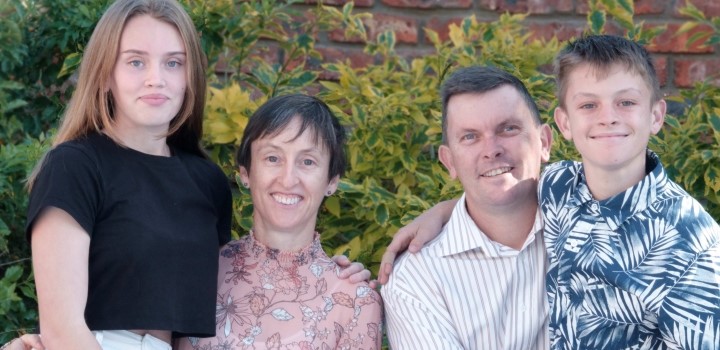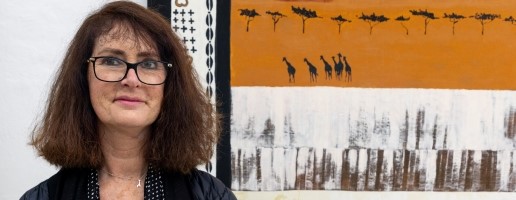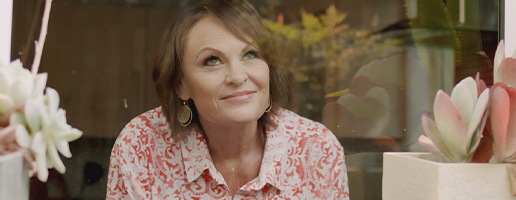Veronica's skin cancer leads her to a clinical trial for immunotherapy

Mole mapping - done by her dermatologist - helped Veronica Tinley (48) detect melanoma (skin cancer) in its early stages. Later, when the cancer spread, she was accepted into a clinical trial for immunotherapy treatment, which has increased her lifespan significantly
"In 2015 I consulted a dermatologist because I'd contracted a skin disease. He recommended mole mapping because my skin is fair and full of moles and freckles," explains Veronica. "This really paid off, because a year later we noticed that one of my moles had changed slightly. He cut it out and found that it was a melanoma (skin cancer). Because we caught it early, I didn't have to undergo any other treatment at the time."
- In mole mapping, photos are taken of your moles to track changes to them over time. Changes in the shape, size or colour of a mole could indicate a melanoma. If a melanoma is detected and removed at an early stage, this could prevent the cancer from spreading.
But 18 months later, in 2018, the cancer was found to have spread to the lymph nodes in Veronica's armpit. "The lymph nodes were surgically removed, and I went for radiation therapy." Then, in 2019, a metastatic lesion was found in Veronica's small intestine, and it too was removed
Immunotherapy trial gives Veronica hope
Soon after that Veronica was accepted to be part of a clinical trial for immunotherapy. "Immunotherapy helps your immune system to do what it was designed to do - find and fight cancer," she explains. "The prognosis for people with melanoma who had received immunotherapy improved drastically, which is why I was so excited to be part of the trial. I want to be there to see my two children finish school and university, and hopefully have children of their own.
"Immunotherapy is amazing because it doesn't have the same severe side effects as chemotherapy. I didn't lose my hair or feel nauseous. The only side effects I experienced were some tiredness and an occasional skin rash and I was able to keep on doing all things I normally do, like my work as a physiotherapist and caring for my children - my daughter who is 16 years old and my son who is 14.
"For two years I travelled from my home in Gqeberha to Johannesburg every three weeks, and later, every six weeks, to receive this treatment, which is administered through an intravenous line. During the COVID-19 hard lockdown we couldn't fly to Joburg and my husband, who has been very supportive, would drive up with me."
In 2022 another metastatic lesion was removed from Veronica's small intestine, and she is receiving ongoing treatment for her cancer.
"During the clinical trial I went for regular CT scans. Now I go for PET scans every three months to monitor the cancer," she says.
DHMS's Oncology Care Programme covers Veronica's cancer treatments
"The treatments I have been on are very expensive and Discovery Health Medical Scheme has been really helpful in paying for between 50 - 75% of the medicines. It is incredible that they have forked out so much money."
- Discovery Health Medical Scheme members have comprehensive cover for cancer on the Oncology Care Programme.
Veronica focuses on healthy living
Veronica explains: "Since 2018 I have been on a strict diet to help my immune system. I've cut out sugar and carbohydrates. I try to sleep sufficiently. I also try to get moderate to vigorous exercise almost every day. I joined a tennis club and this year started playing league tennis for the first time.
"Tennis is great because it's exercise but also involves social interaction. I help the club organise events and also provide encouragement to less confident and young tennis players."
Stay positive and get support
As Veronica's cancer journey continues, she remains optimistic. "Becoming negative is easy. But I focus on trying to be positive because I'm in there to fight this," she says. "My doctors say I've survived longer than expected, which I'm grateful for."
Veronica says her husband, children and parents have been very supportive. "It has been hard on all of them. A few of my friends of a similar age passed away earlier this year. I think that made my children realise that people with cancer can pass away. But I'm still here and generally able to do everything I need to do as a mom.
"My faith has played an important part in helping me. I try to be involved in church activities, pray, and accept help from friends and family when needed.
"I encourage other people with cancer to be grateful for what you do have and reach out to your support group when you need them."
- Discovery Health Medical Scheme members get essential screening and prevention benefits which provide cover for various screening tests. These include tests for blood glucose, cholesterol, HIV, Pap smear or HPV test for cervical cancer screening, mammograms or ultrasounds for breast cancer screening, and prostate cancer screening. They can detect early warning signs of serious diseases of lifestyle and of certain cancers.
Related articles

Vivienne refuses to let a brain tumour removal stop her creativity
In July, the popular White River Gallery exhibited Vivienne Lawrence's art - mixed medium paintings and screen prints. The exhibition comes only three years after Vivienne had a cancerous brain tumour removed. The tumour caused loss of function of her dominant right arm and hand.

Princess Nakedi is a triple negative breast cancer survivor
Princess Nakedi was so excited about 2020 and had been carefully planning her big 50th birthday bash a year in advance. But the universe obviously had other ideas because a month before lockdown, she was diagnosed with triple negative breast cancer.

"Turning my lemon (breast cancer) into lemonade"
When Alison Tucker was diagnosed with breast cancer she made the conscious decision to handle the ensuing uncertainty with as much positive thought and action as possible. Alison not only achieved this ideal but also managed to capture her mindset in her new book.